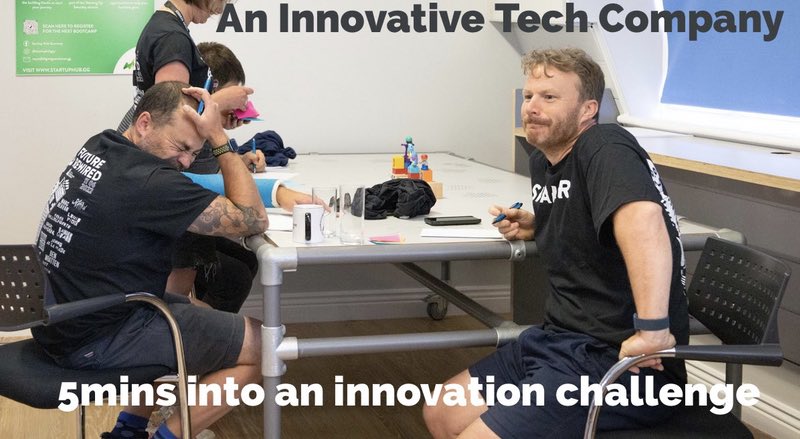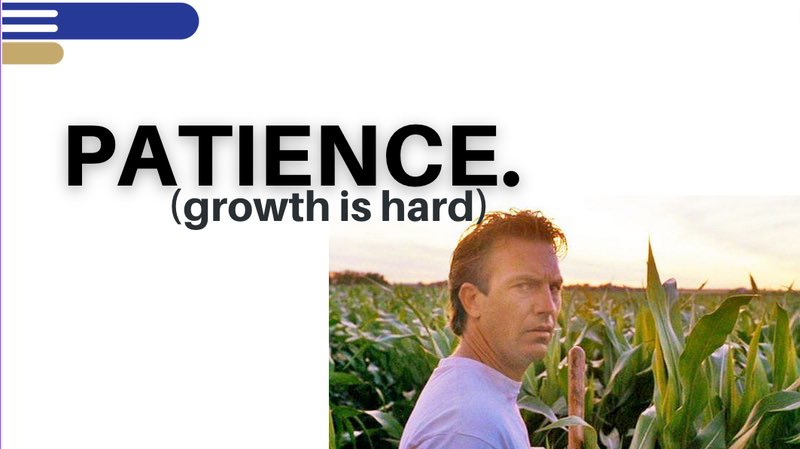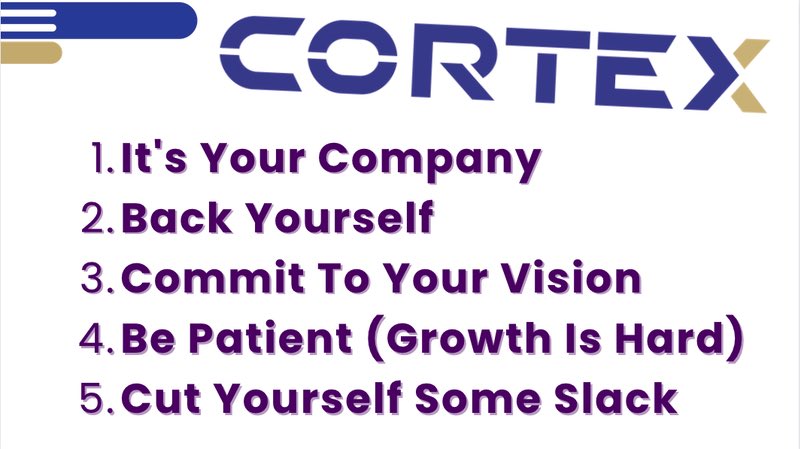4 years and counting? Future Rewired session summary
we're definitely not just making it up as we go along
2022-06-14 13:01:33

Future Rewired at the Digital Greenhouse this year was on Sat 10th June. Marc and Matt both attended, and indeed spoke... (and cleaned up on the innovation competition, natch!)

Marc did a technical deep-dive on using Docker for .NET development - a well-attended session.
Matt, on the other hand, presented on the 'Innovation and Entrepreneur' track with a session on some of the headline things that have been learnt over four years in business with Cortex (and drawing on previous business experience.
This was not focused on how to start a business or how to bring a product to market; instead it was looking at some of the things that are less-obvious, and usually only discovered by experiencing them... aka learning the hard way.
It was presented as a list of five, summarised thusly:

When you start a business, it's really easy to get excited and carried away with all the obvious things that are required to start a business. Registering a company, getting bank accounts, getting a website and social channels, talking to people, gaining opportunities and leads and of course, actually developing your product or service. Before you know it weeks, months or longer have passed and you can find yourself in a position of running the business you started, but potentially without the clear vision of why. Or how to measure your successes.
People start their own business for all sorts of reasons. It might be that they just want to make a pile of cash, or change the world in some way, or leave a legacy. Or it might be that you want a change of lifestyle - a business that fits around your family commitments or other activities. You might have a sense of what working your perfect job would feel like.
A lot of these things will come naturally - you will inevitably slot in to the pace and approach that suits you.
But at the outset is the best time to take time to pencil out these things, so that in 6 months or 18 months or 5 years time you have something to refer back to, which will help you assess whether you're doing what you set out to do.
In our case, we spent a lot of time doing a lot of cool things, but you could only really peg a handful of these things directly to the goals and vision we'd set out. In fact, we never really wrote down the vision until a few years in to the business. Oops.

Some people don't struggle with confidence. Estate agents, used car dealers, mobile phone salesmen etc. And there is a difference in (mis-placed) confidence and believing in yourself. See the 'Dunning-Kruger' effect for more info, but the lesser known side of that is where people who are talented at something, find it so easy, that they believe that it must be easy for everyone, and so therefore underestimate their actual abilities.
You absolutely can do more than you think. A business owner must make decisions and must take responsibility for them. It's common when you're new in business to seek advice and counsel from other people - and this is fine, and recommended - but provided you are able to own the decisions and outcomes.
There is nobody - literally nobody - who can tell you what to do and guarantee your success. Business is hard, and at some point you just have to do it. The mistakes you make will rarely be as bad as you think they could be. You'll learn, and you'll do better next time.
This challenge magnifies when you have staff and/or other interests in the business. The business is typically the vision and dream of its founder(s) - and not only do you have to sell that vision to other people, who will challenge it, but also you can not expect them to live and dream it in the same way you do.
#3: Commit To Your Vision

Marc did a technical deep-dive on using Docker for .NET development - a well-attended session.
Matt, on the other hand, presented on the 'Innovation and Entrepreneur' track with a session on some of the headline things that have been learnt over four years in business with Cortex (and drawing on previous business experience.
This was not focused on how to start a business or how to bring a product to market; instead it was looking at some of the things that are less-obvious, and usually only discovered by experiencing them... aka learning the hard way.
It was presented as a list of five, summarised thusly:
#1: When you start a business, it's your business

When you start a business, it's really easy to get excited and carried away with all the obvious things that are required to start a business. Registering a company, getting bank accounts, getting a website and social channels, talking to people, gaining opportunities and leads and of course, actually developing your product or service. Before you know it weeks, months or longer have passed and you can find yourself in a position of running the business you started, but potentially without the clear vision of why. Or how to measure your successes.
People start their own business for all sorts of reasons. It might be that they just want to make a pile of cash, or change the world in some way, or leave a legacy. Or it might be that you want a change of lifestyle - a business that fits around your family commitments or other activities. You might have a sense of what working your perfect job would feel like.
A lot of these things will come naturally - you will inevitably slot in to the pace and approach that suits you.
But at the outset is the best time to take time to pencil out these things, so that in 6 months or 18 months or 5 years time you have something to refer back to, which will help you assess whether you're doing what you set out to do.
In our case, we spent a lot of time doing a lot of cool things, but you could only really peg a handful of these things directly to the goals and vision we'd set out. In fact, we never really wrote down the vision until a few years in to the business. Oops.
#2: Back Yourself

Some people don't struggle with confidence. Estate agents, used car dealers, mobile phone salesmen etc. And there is a difference in (mis-placed) confidence and believing in yourself. See the 'Dunning-Kruger' effect for more info, but the lesser known side of that is where people who are talented at something, find it so easy, that they believe that it must be easy for everyone, and so therefore underestimate their actual abilities.
You absolutely can do more than you think. A business owner must make decisions and must take responsibility for them. It's common when you're new in business to seek advice and counsel from other people - and this is fine, and recommended - but provided you are able to own the decisions and outcomes.
There is nobody - literally nobody - who can tell you what to do and guarantee your success. Business is hard, and at some point you just have to do it. The mistakes you make will rarely be as bad as you think they could be. You'll learn, and you'll do better next time.
This challenge magnifies when you have staff and/or other interests in the business. The business is typically the vision and dream of its founder(s) - and not only do you have to sell that vision to other people, who will challenge it, but also you can not expect them to live and dream it in the same way you do.



